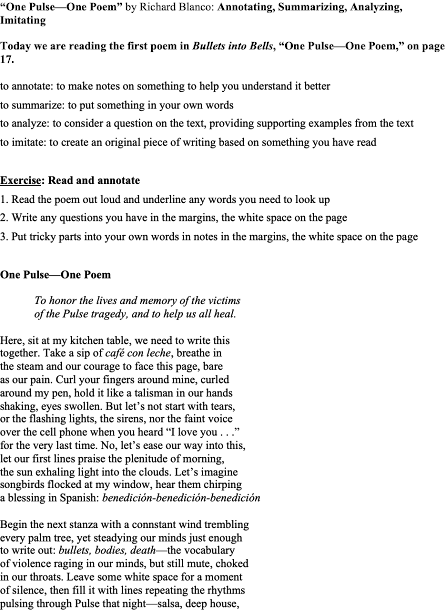Week 63: College Reading and Writing: Pádraig Ó Tuama
Week 63: College Reading and Writing: Pádraig Ó Tuama
Pádraig Ó Tuama: Annotating, Summarizing, Analyzing, Imitating
to annotate: to make notes on something
to help you understand it better
to summarize: to put something in your
own words
to analyze: to consider a question on the
text, providing supporting examples from the text
to imitate: to create an original piece
of writing based on something you have read
Exercise: Read and annotate
1. Read the poem out loud and underline
any words you need to look up
2. Write any questions you have in the
margins or in your notebook
3. Put tricky parts into your own words
in notes in the margins or in your notebook
Exercise: Questions for comprehension of the poem
1. How does sound work in this poem?
2. What do you notice about the words?
3. What does the title teach the reader?
Exercise: Summarize the poem
Write a paragraph summarizing the poem
with quotations, in-text citation, and a Work Cited Page.
Example too-short summary, incorporating quotation and in-text
citation:
Brenda Hillman’s poem “The Family Sells the
Family Gun” tells the story of siblings getting rid of their father’s gun after
“his ashes...were lying” (87). The speaker questions what it means to own and
get rid of a gun in America, saying, “[w]e couldn’t take it to the cops even in
my handbag” (Hillman 88).
Work Cited Page (for today’s
poem)
Ó Tuama, Pádraig. “Makebelieve.”Poem-a-Day, Poets.org, 2019, https://www.poets.org/poetsorg/poem/makebelieve
Exercise: Analysis
Question for analysis: This poem is about
religion and humanity. Ó Tuama says, “[w]hen it comes to
‘Freedom of Religion’, much attention is given to the words freedom and religion. However, the of
is also worthy of mention. Religion is free; it is free to query, to make
meaning, to break things, to make things up.” Do you think this poem questions
religion, breaks impressions of creation, and makes things up? Remember
to use quotation and citation as you support your points.
Exercise: Imitation
Write
a creation poem. It can be the creation of the world, the creation of you, the
creation of an object. It is up to you.
Use elements from ford’s poem that you admire to make your own story
stronger.
Homework:
1. Summary of Poem
2. Analysis of Poem
3. Imitation of Poem
About this class:
Your notebooks belong to you; you can
write first drafts in them, and make notes for yourselves. To turn in homework, revise your work in a
blue book or sheets of paper you can get from your instructor. In this class,
you are welcome to submit homework for a grade. If it’s not strong enough to
earn an A, I’ll give you some comments to help you revise it, and let you do it
over again. You have as many chances as you want to complete and perfect the
work in this class, and you are welcome to do more than one week’s worksheet
for homework at a time; ask me for sheets you’ve missed. Students who complete
15 weeks of graded assignments and a longer paper can qualify for college
credit. When you get close to completing 15 weeks, I’ll help you get started on
your longer paper.
And
on the first day
god
made
something
up.
Then
everything came along:
seconds,
sex and
beasts
and breaths and rabies;
hunger,
healing,
lust
and lust’s rejections;
swarming
things that swarm
inside
the dirt;
girth
and grind
and
grit and shit and all shit’s functions;
rings
inside the treetrunk
and
branches broken by the snow;
pigs’
hearts and stars,
mystery,
suspense and stingrays;
insects,
blood
and
interests and death;
eventually,
us,
with
all our viruses, laments and curiosities;
all
our songs and made-up stories;
and
our songs about the stories we’ve forgotten;
and
all that we’ve forgotten we’ve forgotten;
and
to hold it all together god made time
and
those rhyming seasons
that display decay.


Comments
Post a Comment